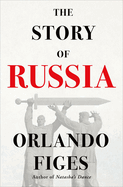
To understand the Russia of today requires knowing how Russians have defined--and redefined--themselves for centuries, according to renowned historian Orlando Figes's The Story of Russia. The "story" of Russia, he claims, is not so much about people and events but those ideas rooted in the distant path that are "continuously reconfigured and repurposed to suit its present needs and reimagine its future."
From its debated origin stories ("no other country has been so divided over its own beginnings") in Kievan Rus in the first millennium to Vladimir Putin's aggressive nationalism in the third, Figes (The Europeans; Natasha's Dance) expertly dissects the impulses and most cherished ideas that animate Russia, then and now. He explains how religion played a critical role in strengthening the imperial autocracy as Russia adopted the "Third Rome doctrine," positioning itself as the last bastion of the Christian Orthodox faith after Byzantium's collapse. In the person of the divinely ordained tsar, Figes sees the first signs of a developing imbalance between state and society. Indeed, among Figes's many compelling analyses is the sharp observation of autocracy's "persistent" presence throughout Russia's troubled history--and into its present. He cites the lack of public institutions during centuries of monarchical rule as a critical absence, whereby autocracy flourished "less by the state's strength than by the weakness of society."
In The Story of Russia, Figes draws on a lifetime of scholarship to provide an energetic and revelatory narrative of the ideas Russia employs to reimagine itself continually. --Peggy Kurkowski, book reviewer and copywriter in Denver

